Table of Contents[Hide][Show]
- Nutrivore Score for Atlantic Mackerel – 922
- Atlantic Mackerel Nutrition Facts
- Atlantic Mackerel Nutrition Varies With Cooking and Processing
- Mackerel Nutrition Varies With Type
Health Benefits of Atlantic Mackerel Nutrients+−
- Atlantic Mackerel Provides 1058% DV EPA+DHA
- Atlantic Mackerel Provides 417% DV Vitamin B12 (Cobalamin)
- Atlantic Mackerel Provides 7.8 mg of CoQ10
- Atlantic Mackerel Provides 93% DV Vitamin D
- Atlantic Mackerel Provides 92% DV Selenium
- Atlantic Mackerel Provides 65% DV Vitamin B3 (Niacin)
- Atlantic Mackerel Provides 21.4 g of Protein
- Atlantic Mackerel Provides 31% DV MUFA
- Atlantic Mackerel Provides 28% DV Vitamin B2 (Riboflavin)
- Atlantic Mackerel Provides 27% DV Vitamin B6 (Pyridoxine)
- Atlantic Mackerel Provides 27% DV Vitamin B7 (Biotin)
- Atlantic Mackerel Provides 26% DV Iodine
- Atlantic Mackerel Provides 89.7 mg of Taurine
- Atlantic Mackerel Provides 21% DV Magnesium
- Atlantic Mackerel Provides 20% DV Phosphorus
- Atlantic Mackerel Provides 20% DV Vitamin B5 (Pantothenic Acid)
- How Much Atlantic Mackerel Should We Eat Per Day?
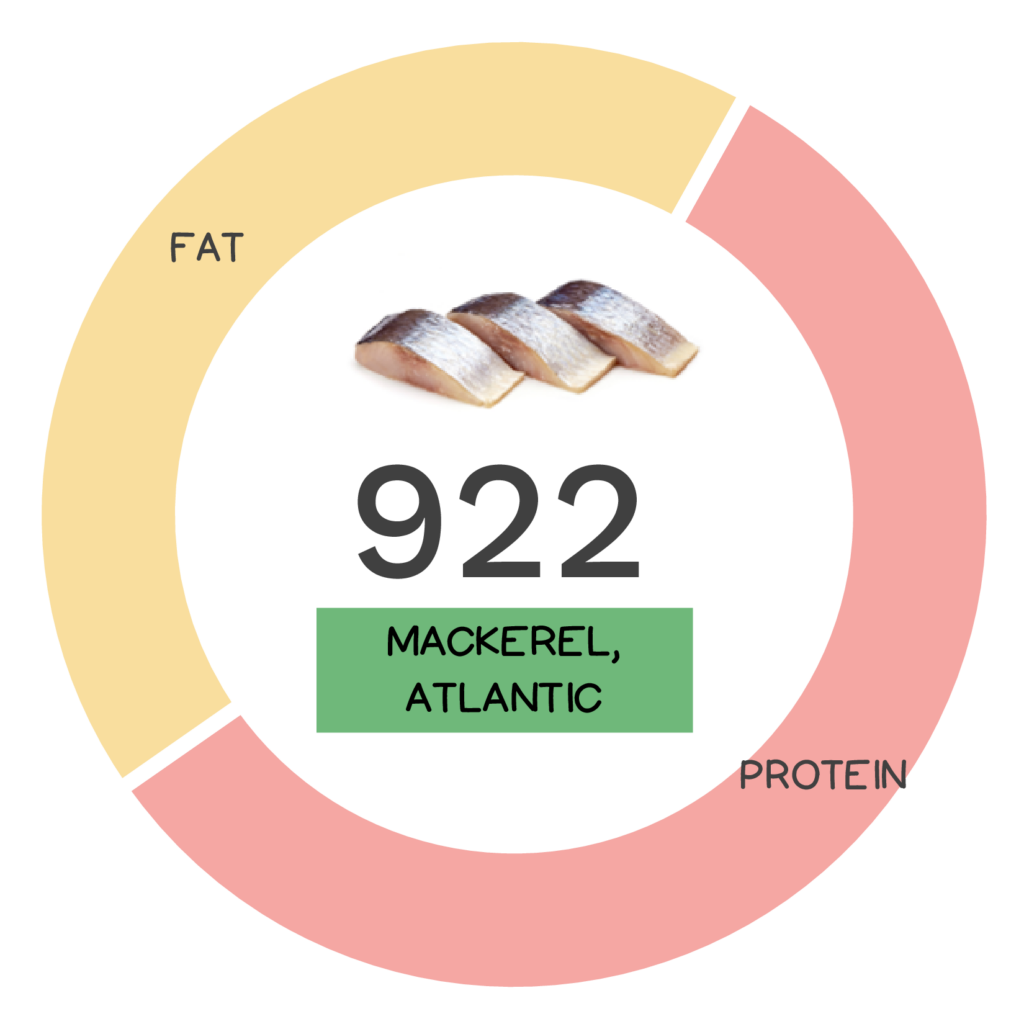
Mackerel is an important recreational sport and commercial fish, consumed world-wide and prized for its nutrient density. Not only is this fish a rich source of omega-3s, it’s also one of the few dietary sources of vitamin D in our modern food supply! All I have to say about that is – what a great catch! (Pun intended!)
There are over 30 different species of mackerel, including Atlantic mackerel, chub mackerel, and the king mackerel (aka kingfish).
Mackerel does not refer to one specific fish but to a number of different species of fatty, cold-water fish, that are closely related to tuna, for the most part members of the Scombridae family of fish (though some mackerel are found in Auxis and Rastrelliger families too). These fish are found in open-water, in both temperate and tropical seas, mostly living along the coast or just offshore. In general, mackerel have restricted ranges, which vary geographically depending on species (and there are a lot of them!). In fact, there are over 30 different species of mackerel, including the well-known Atlantic mackerel (found along both coasts of the North Atlantic Ocean), chub mackerel (found in both the Pacific and Atlantic oceans), and the king mackerel, aka kingfish, (which travels the western Atlantic Ocean and Gulf of Mexico). Mackerel travel in large schools (sometimes extending for several miles) all around the globe migrating along the coast or across oceans.
These fish are similar to their tuna-cousins but tend to be smaller and slimmer in size. Their bodies are torpedo-shaped with a row of small finlets, they have extremely small to non-existent scales, tend to have forked tails, and are excellent swimmers. They have prominent vertical stripes on their backs, which helps them stay in formation as they school – allowing them to line up with other fish based on position and speed. Often times predators follow these schools, attacking them in cooperative ways. Mackerel themselves are carnivorous, feeding on other small fish, plankton, crustaceans, fish eggs, or mollusks depending on where they live.
Over 5 million tons of mackerel are commercially fished on an annual basis. The chub mackerel, Atlantic mackerel and Chilean jack mackerel together account for the majority of fished mackerel. However, mackerel has a draw-back in that it spoils quickly, which means it needs to be eaten fresh or properly cured (e.g., pickled) to avoid scomboid food poisoning. Historically, this meant a lot of spoiled mackerel! Lucky for us, with the wide-spread availability of canning, refrigeration and freezing, this is no longer a pressing issue.
Learn What Foods to *ADD* to Your Diet
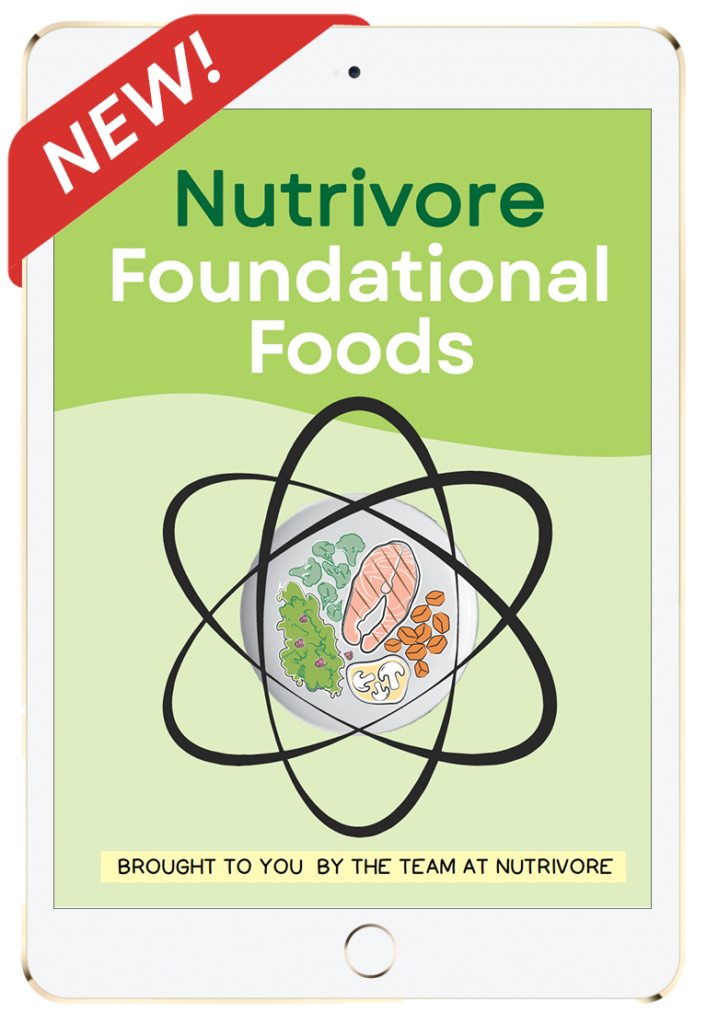
Nutrivore Foundational Foods
Learn what makes the 12 Nutrivore foundational food families nutritionally unique, their health benefits, which options are the most nutrient dense, how much of them to eat, plus various fun facts, practical pointers, and busting of common myths.
This very helpful resource will introduce you to new foods and expand your nutrition knowledge, making food choices easier!
Buy now for instant digital access.
Nutrivore Score for Atlantic Mackerel – 922

Atlantic mackerel has a Nutrivore Score of 922, making it a super nutrient-dense food! Plus, it is a low-carb food; Atlantic mackerel has 0 grams of net carbs per 115 gram serving.
Per serving, Atlantic mackerel is a best source (>50% daily value) of coQ10, EPA+DHA, selenium, vitamin B3 (niacin), vitamin B12 (cobalamin) and vitamin D; an excellent source (20-50% daily value) of iodine, magnesium, monounsaturated fatty acids (MUFA), phosphorus, protein, taurine, vitamin B2 (riboflavin), vitamin B5 (pantothenic acid), vitamin B6 (pyridoxine), and vitamin B7 (biotin); and a good source (10-20% daily value) of alpha-linolenic acid (ALA), choline, iron, vitamin B1 (thiamin), and vitamin E.
Ditch Diets. Embrace Nutrients. Start with this FREE Guide.
Sign up for the free Nutrivore Newsletter, your weekly, science-backed guide to improving health through nutrient-rich foods — without dieting harder —and get the Beginner’s Guide to Nutrivore delivered straight to your inbox!

Atlantic Mackerel Nutrition Facts
One serving of Atlantic mackerel is standardized to 115 grams (4 ounces). For reference, a typical fillet of of Atlantic mackerel is 112 grams, which is approximately equivalent to 1 serving. When you cook Atlantic mackerel, it reduces in volume by approximately 20%: 100 grams of Atlantic mackerel is roughly equivalent to 78 grams of cooked Atlantic mackerel.
Atlantic Mackerel Nutrition Facts Per Serving
| Atlantic mackerel, raw | Nutrivore Score: 922 | Nutrient Density: Super! |
|---|---|---|
| Serving Size: 4 ounces (115 grams) | Protein: 21.4 grams | Net Carbohydrates: 0.0 grams |
| Calories: 236 | Total Fat: 16 grams | Dietary Fiber: 0.0 grams |

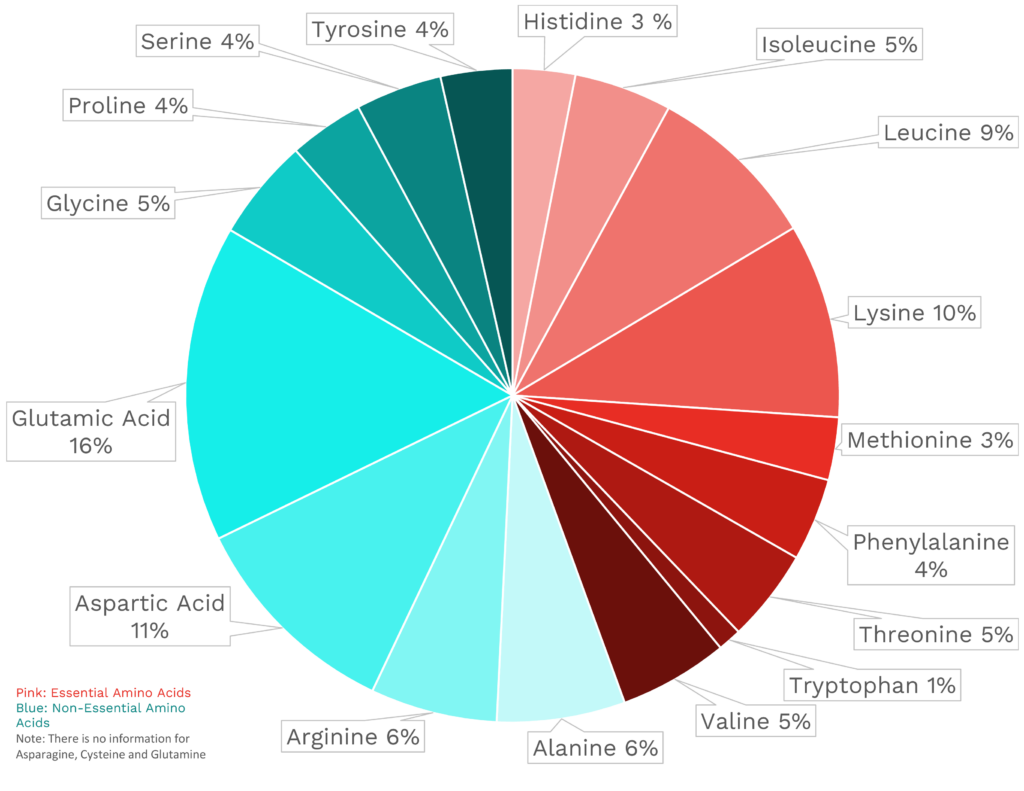
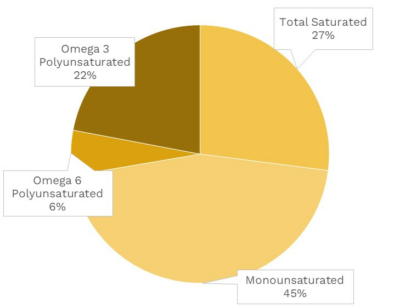
| VITAMINS | ||
|---|---|---|
| Vitamin A | 57.5 μg RAE | 6% DV |
| Vitamin B1 (Thiamin) | 202.4 μg | 17% DV |
| Vitamin B2 (Riboflavin) | 358.8 μg | 28% DV |
| Vitamin B3 (Niacin) | 10.4 mg | 65% DV |
| Vitamin B5 (Pantothenic Acid) | 1.0 mg | 20% DV |
| Vitamin B6 (Pyridoxine) | 458.9 μg | 27% DV |
| Vitamin B7 (Biotin) | 8.1 μg | 27% DV |
| Vitamin B9 (Folate) | 1.2 μg | 0% DV |
| Vitamin B12 (Cobalamin) | 10.0 μg | 417% DV |
| Vitamin C | 0.5 mg | 1% DV |
| Vitamin D (D2 + D3) | 18.5 μg | 93% DV |
| Vitamin E | 1.7 mg | 12% DV |
| Vitamin K | 5.8 μg | 5% DV |
| Choline | 74.8 mg | 14% DV |
| Myo-Inositol | ~ | ~ |
| CoQ10 | 7.8 mg | ~ |
| FUNCTIONAL FATS | ||
|---|---|---|
| MUFA | 6.3 g | 31% DV |
| ALA | 182.9 mg | 11% DV |
| EPA + DHA | 2643.9 mg | 1058% DV |
| CLA | 4.8 mg | ~ |
| Linoleic Acid | 0.3 g | 1% DV |
| MCT’s | 0.0 g | ~ |
| MINERALS | ||
|---|---|---|
| Calcium | 13.8 mg | 1% DV |
| Copper | 84.0 μg | 9% DV |
| Iodine | 39.5 μg | 26% DV |
| Iron | 1.9 mg | 10% DV |
| Magnesium | 87.4 mg | 21% DV |
| Manganese | 17.3 μg | 1% DV |
| Phosphorus | 249.6 mg | 20% DV |
| Potassium | 361.1 mg | 8% DV |
| Selenium | 50.7 μg | 92% DV |
| Sodium | 103.5 mg | 5% DV |
| Zinc | 0.7 mg | 7% DV |
| PHYTONUTRIENTS | ||
|---|---|---|
| Carotenoids | 0.0 μg | ~ |
| Polyphenols | 0.0 mg | ~ |
| Phytosterols | 0.0 mg | ~ |
| Glucosinolates | ~ | ~ |
| Thiosulfinates | ~ | ~ |
| Betalains | ~ | ~ |
| AMINO ACIDS & PEPTIDES | ||
|---|---|---|
| Taurine | 89.7 mg | ~ |
| Ergothioneine | ~ | ~ |
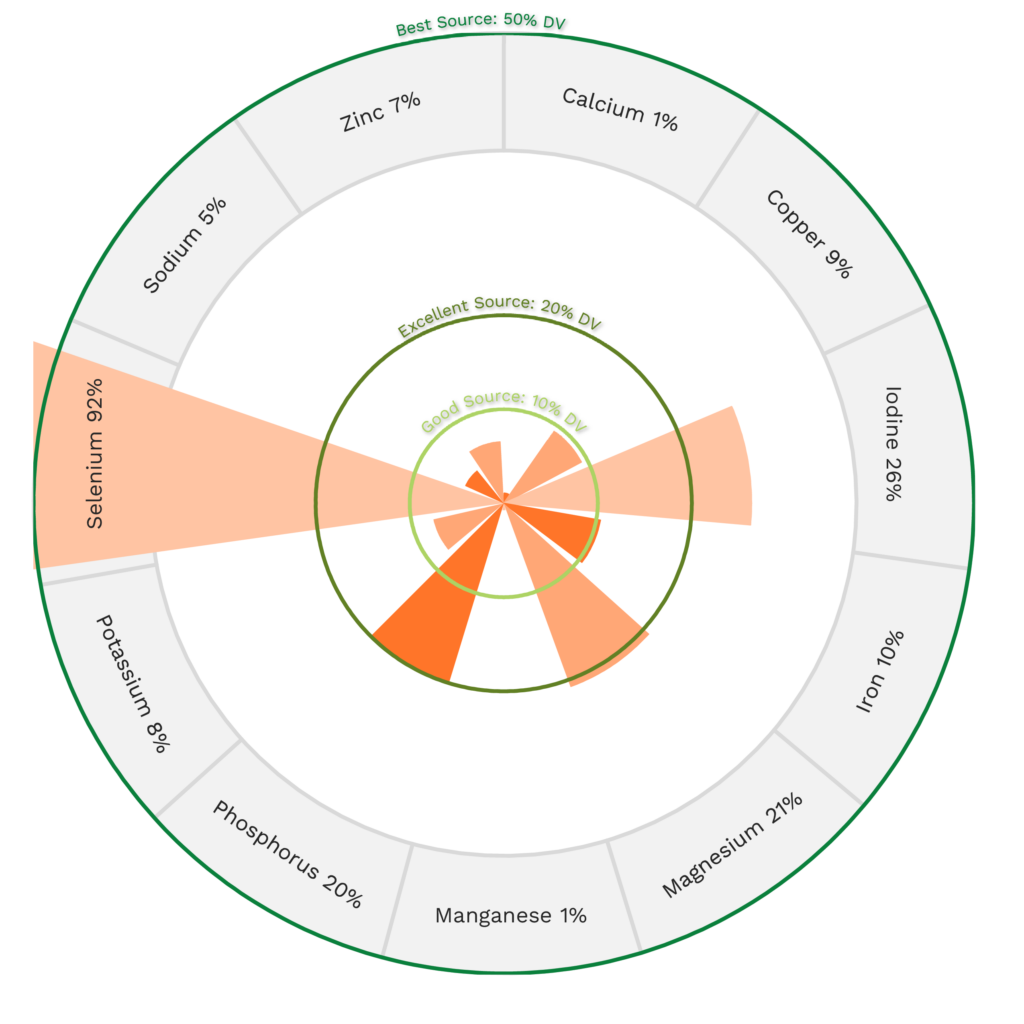
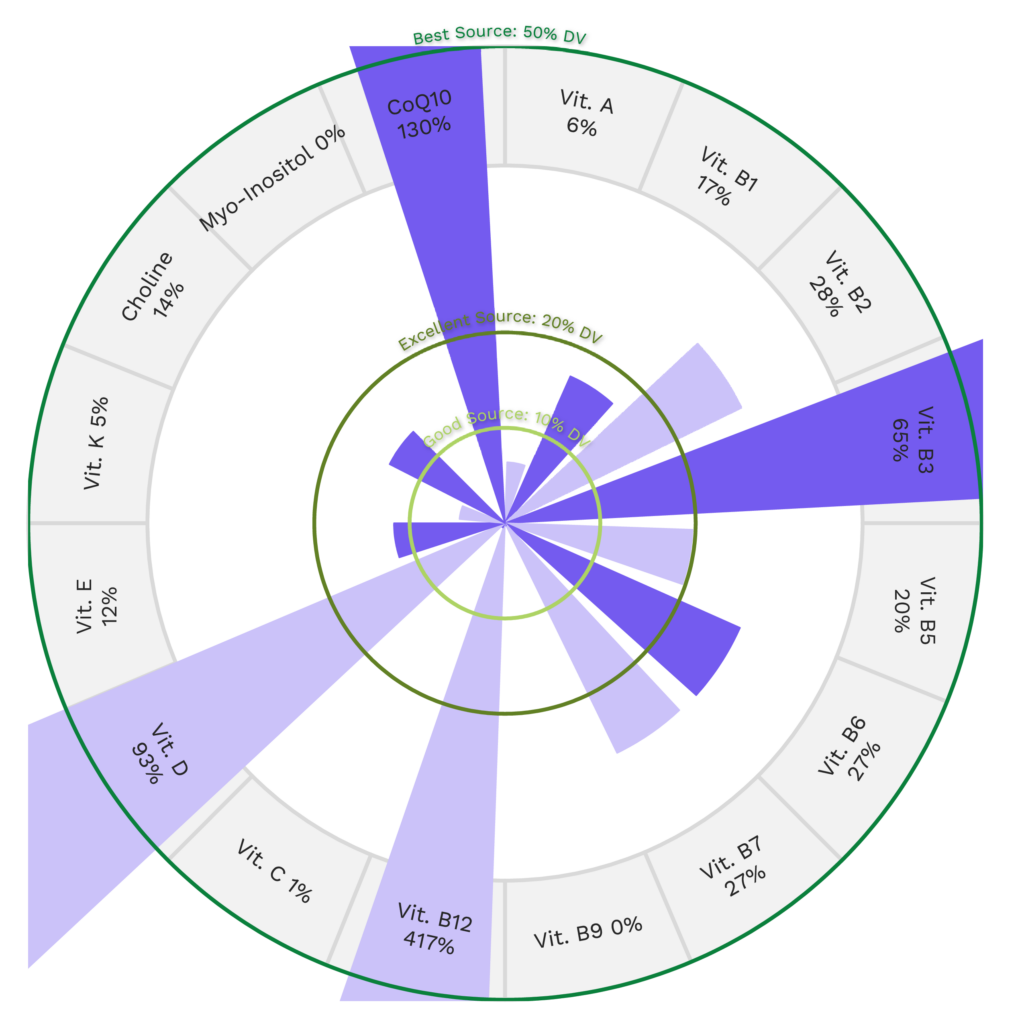
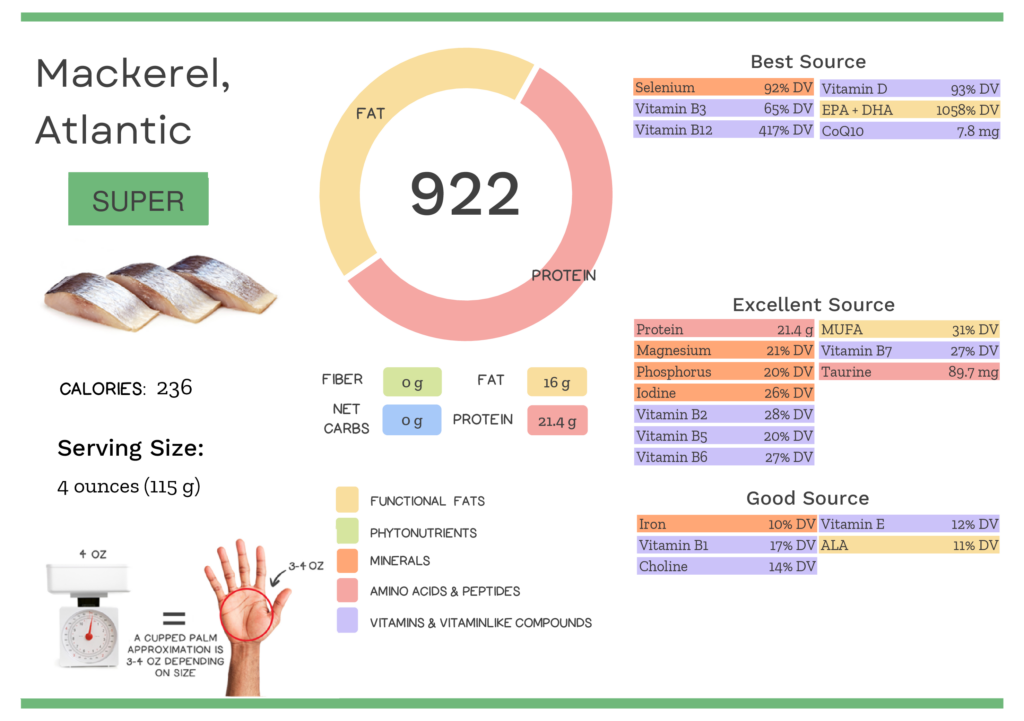

Quality Meat and Seafood
- 100% grass fed and finished beef, pasture-raised pork, pasture-raised chicken and wild-caught seafood
- Raised on regenerative family farms in the USA
- Fast delivery from our farms to your door
- Save 20% off for life, plus $15 off your first box, no coupon required
Atlantic Mackerel Nutrition Varies With Cooking and Processing
The Nutrivore Score of Atlantic mackerel varies depending on processing, method of preparation and the way in which it was raised (farmed or wild-caught). Typically wild-caught fish have higher levels of nutrients which results in higher Nutrivore Scores, but including any type of fish in our diet, farmed or wild-caught, will result in plenty of health benefits!
| NUTRIVORE SCORE | |
|---|---|
| Atlantic mackerel, cooked, dry heat | 761 |
| Atlantic mackerel, raw | 922 |
| Mackerel, salted | 943 |
Mackerel Nutrition Varies With Type
There are many types of mackerel, each with its own unique taste and nutrient profile, which means their Nutrivore Scores also vary. To maximize all the benefits mackerel has to offer, try incorporating different types into your diet –the most commonly fished mackerel species include: the chub mackerel, Atlantic mackerel and Chilean jack mackerel.
| NUTRIVORE SCORE | |
|---|---|
| Atlantic mackerel, raw | 922 |
| King mackerel, raw | 1242 |
| Pacific and jack mackerel (mixed species), raw | 797 |
| Spanish mackerel, raw | 770 |
Impressed by all the bene-FISH-ial nutrition in mackerel? Maybe your friends will be too!
Health Benefits of Atlantic Mackerel Nutrients
Let’s take a closer look at all of the best and excellent source of nutrients found in a 4-ounce serving of Atlantic mackerel and see how they benefit our health.
Atlantic mackerel is a concentrated source of numerous vitamins, minerals, and healthy fats.
Atlantic Mackerel Provides 1058% DV EPA+DHA
Atlantic mackerel is a phenomenal source of EPA+DHA, providing an astounding 1058% of the daily value per 4-ounce serving!
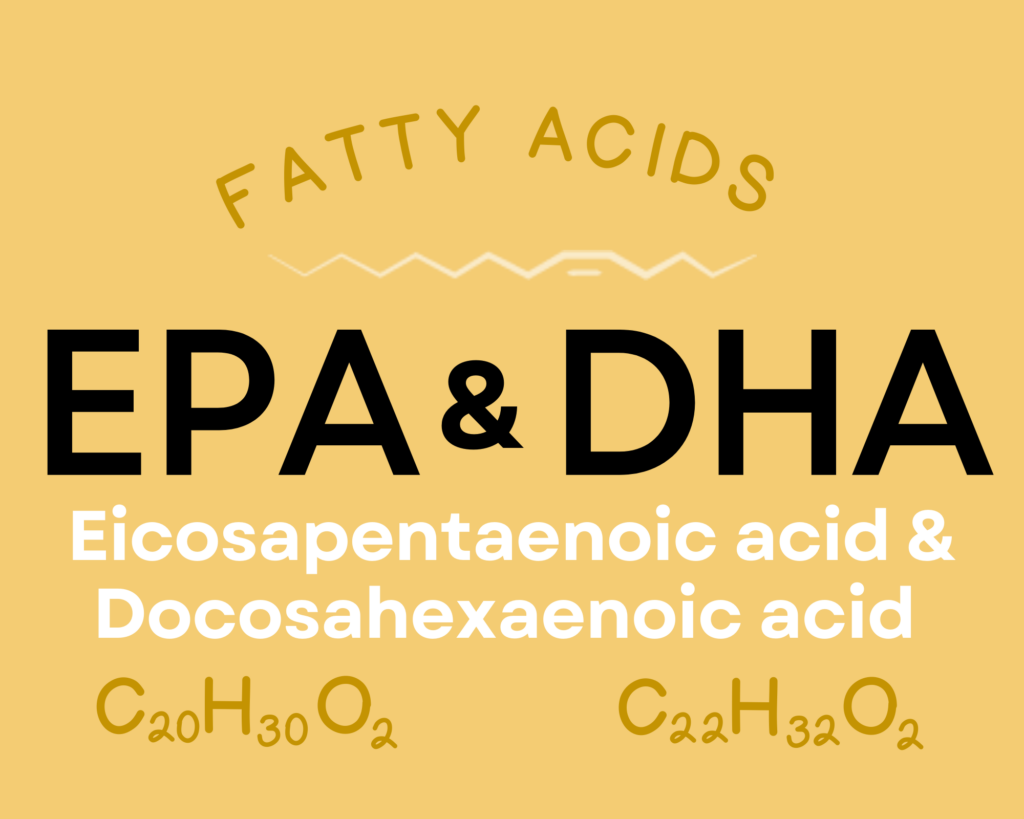
Eicosapentaenoic acid (EPA) and docosahexaenoic acid (DHA) are long-chain omega-3 fats that play important roles in neurological health, immune function, eye health and vision, inflammation, pain signaling, gut health, fetal development, and some aspects of cardiovascular health (like triglyceride levels and blood clotting). They exert many of their effects by helping form chemical messengers called prostaglandins, thromboxanes, and leukotrienes. EPA and DHA also serve as a structural component of the cell membrane, influencing important properties such as membrane fluidity and permeability. Small amounts of them can be synthesized from a shorter-chain omega-3 fat, alpha-linolenic acid (ALA). Learn more about EPA and DHA here.
Atlantic Mackerel Provides 417% DV Vitamin B12 (Cobalamin)
Atlantic mackerel is an outstanding source of vitamin B12 (cobalamin), providing a whopping 417% of the daily value per 4-ounce serving!
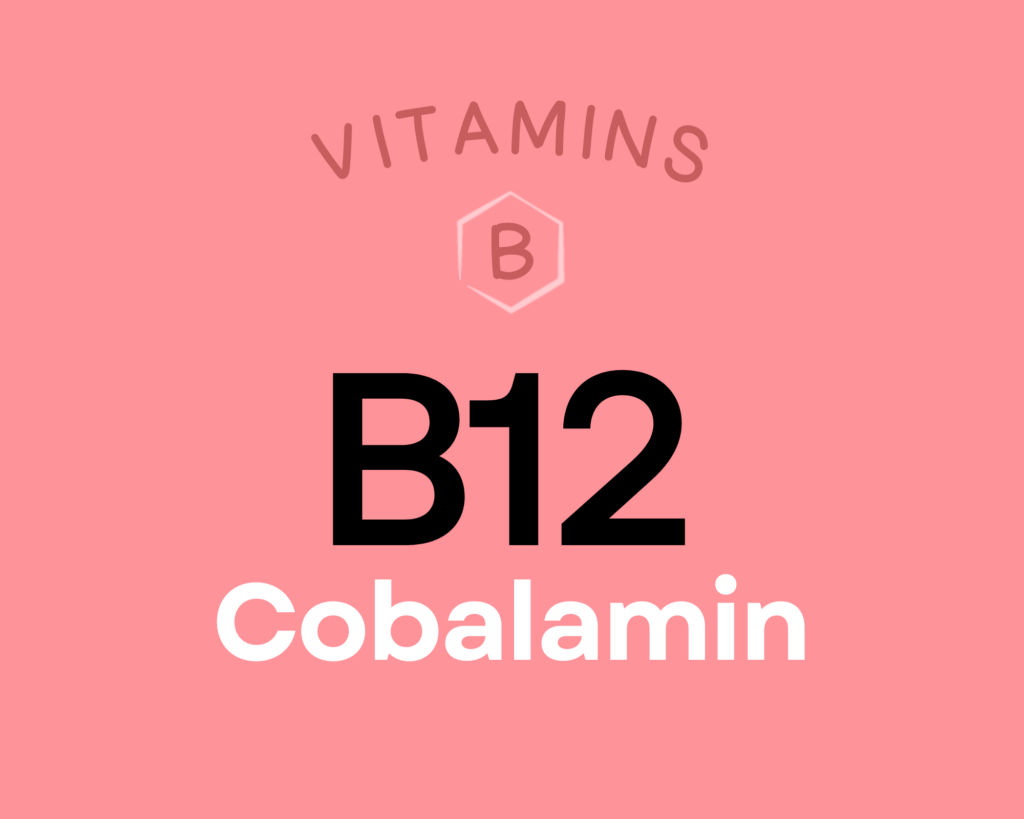
Vitamin B12 (cobalamin) is a water-soluble vitamin that serves as a cofactor for enzymes involved in energy metabolism, red blood cell production, DNA synthesis, neurotransmitter production, nervous system health, and folate metabolism. As a result of these roles, vitamin B12 is vital for maintaining brain and nervous system health, and may have a protective effect against dementia, Alzheimer’s disease, and depression. There’s also some evidence vitamin B12 may be cancer-protective, possibly through supporting folate metabolism (which then assists in repairing DNA damage). Learn more about vitamin B12 here.
Atlantic Mackerel Provides 7.8 mg of CoQ10
Atlantic mackerel is an exceptional source of coQ10, providing 7.8 mg of coQ10 per 4-ounce serving!
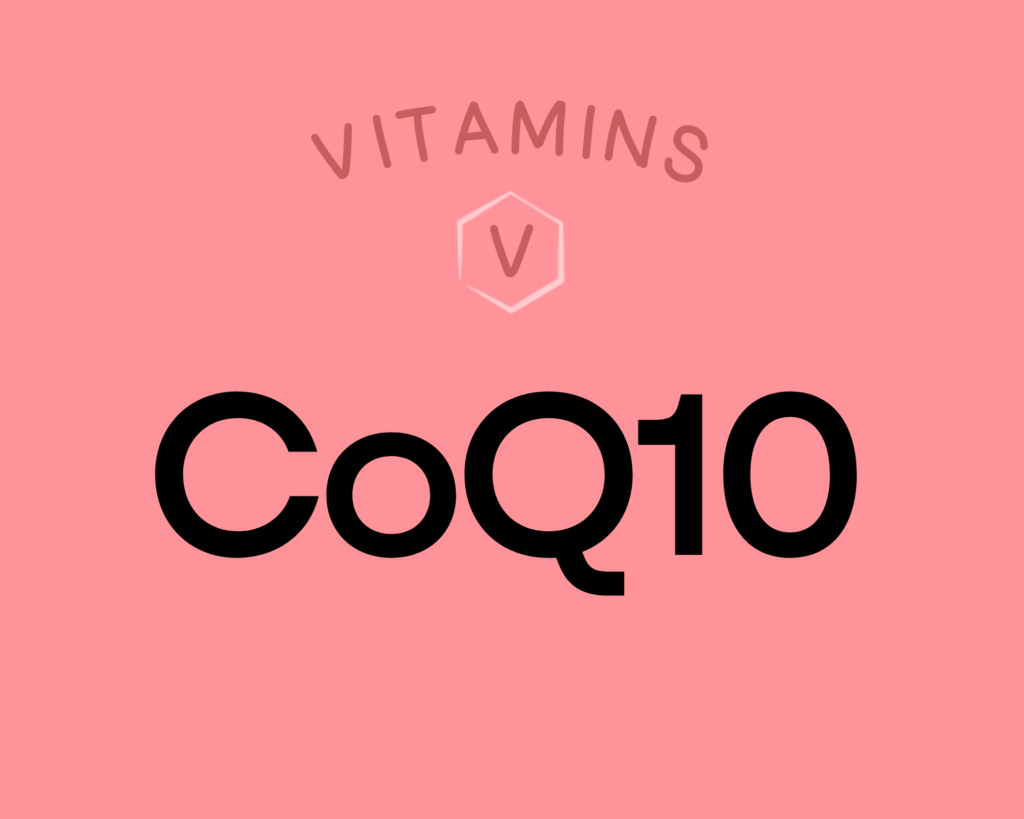
Ubiquinone is the oxidized form and ubiquinol is the reduced, more bioavailable form of the vitaminlike compound coenzyme Q10 (coQ10). CoQ10 is a potent antioxidant and a cofactor in the electron transport chain for the production of ATP. It may be helpful in treating or preventing heart and blood vessel conditions, diabetes, gum disease, muscular dystrophy, chronic fatigue syndrome, and breast cancer. Sources include beef, pork, mackerel, yellowtail fish, and chicken; it’s also found in smaller amounts in vegetables like broccoli and herbs like parsley. Learn more about coQ10 here.
Atlantic Mackerel Provides 93% DV Vitamin D
Atlantic mackerel is a fantastic source of vitamin D, providing an impressive 93% of the daily value per 4-ounce serving!
Mackerel is one of the few dietary sources of vitamin D in our modern food supply.
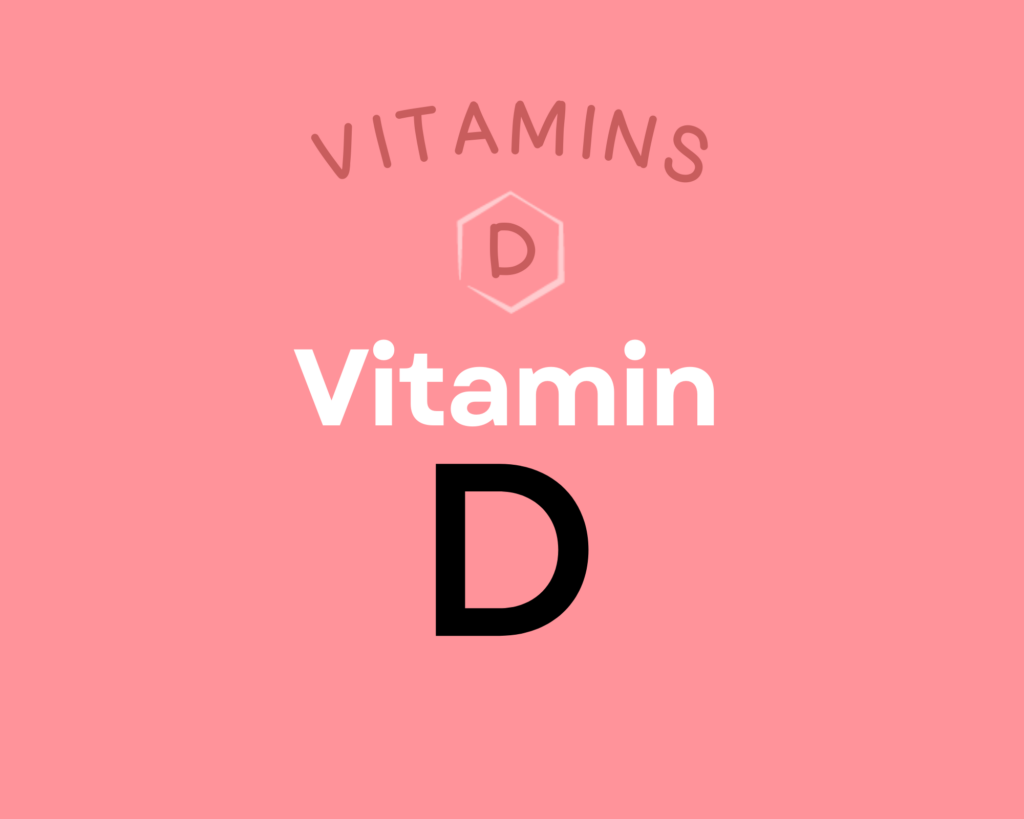
Rather than being a “true” vitamin, vitamin D is a group of fat-soluble steroid hormones that can be either obtained from the diet or synthesized from sun exposure. It plays a major role in cellular differentiation, immune function, endocrine health, cardiovascular health, and even the intestinal absorption of several other nutrients (namely calcium, magnesium, and phosphorus). As a result of these diverse functions, getting enough vitamin D is important for protecting against chronic disease (including diabetes, cancer, and degenerative neurological conditions), maintaining good gut health, and keeping a healthy immune system (including protecting against both infectious disease and autoimmunity). Learn more about vitamin D here.
Atlantic Mackerel Provides 92% DV Selenium
In addition, Atlantic mackerel is a wonderful source of selenium, providing 92% of the daily value per 4-ounce serving!
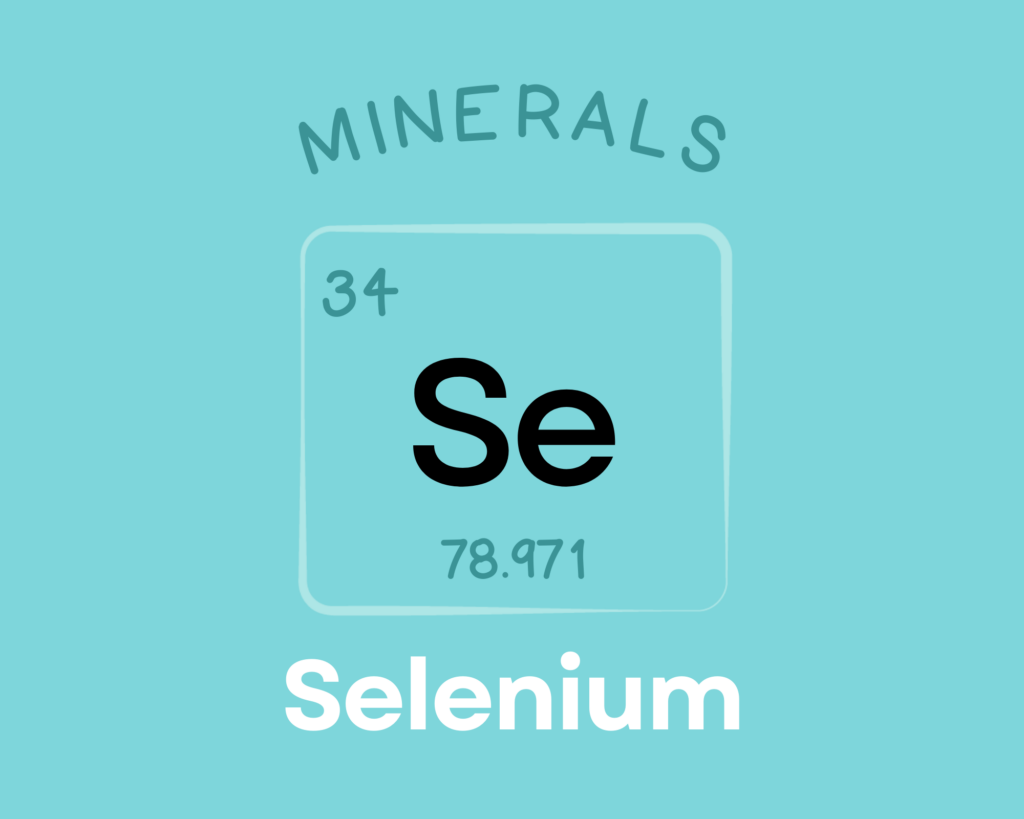
Selenium is a trace mineral needed by all mammals to sustain life. It serves as a component of the non-proteinogenic amino acids selenocysteine and selenomethionine, and also helps form over two dozen selenoproteins involved in reproduction, thyroid hormone metabolism, antioxidant defense, DNA synthesis, and immunity. Observational research suggests selenium could play a protective role against cancer, heart disease, asthma, and inflammatory bowel disease, although human trials have generally been lacking or contradictory. There’s also evidence that selenium can play a preventative role in asthma and inflammatory bowel disease, while also reducing mortality in patients with sepsis. Learn more about selenium here.
Atlantic Mackerel Provides 65% DV Vitamin B3 (Niacin)
Atlantic mackerel is rich in vitamin B3 (niacin), providing 65% of the daily value per 4-ounce serving!
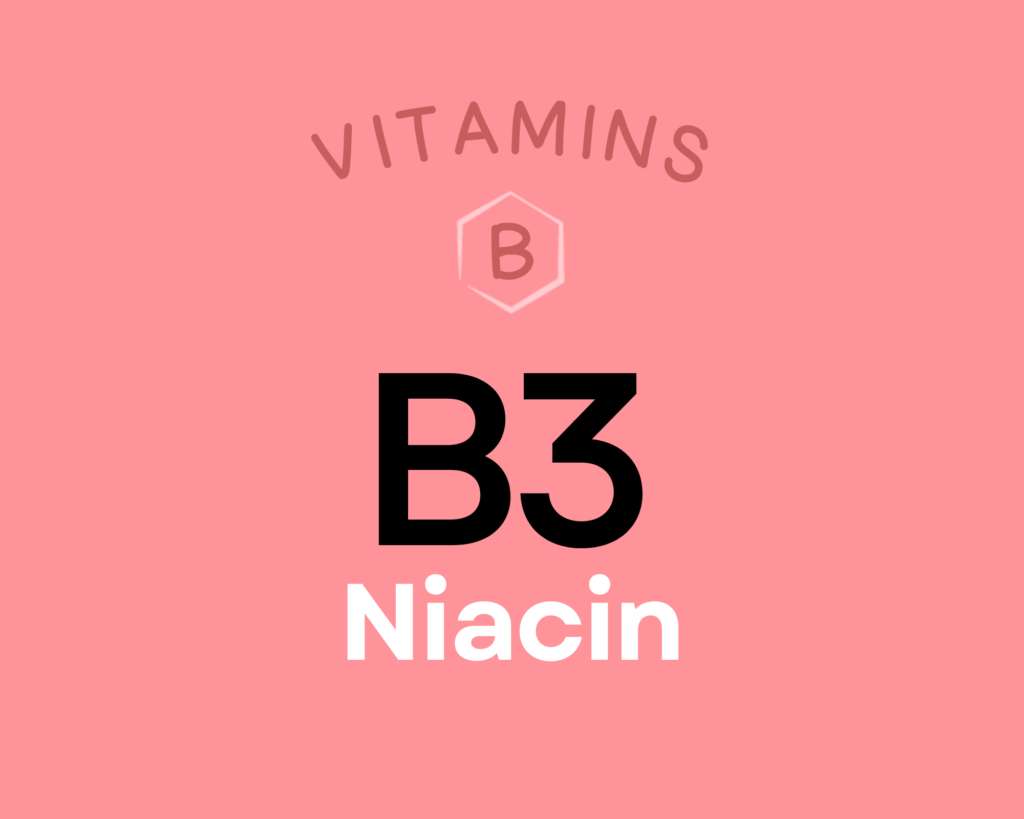
Niacin is a water-soluble B complex vitamin (vitamin B3) that’s needed to produce two very important coenzymes: nicotinamide adenine dinucleotide (NAD) and nicotinamide adenine dinucleotide phosphate (NADP). NAD and NADP are needed for over 400 enzymes involved in DNA repair, fatty acid synthesis, antioxidant systems, detoxification, and hormone synthesis, as well as the breakdown of fat, carbohydrate, protein, and alcohol. Niacin has therapeutic potential for cardiovascular disease and hyperlipidemia, and may also be protective against cancer and type 1 diabetes. Some research suggests it could benefit health outcomes for patients with HIV or schizophrenia as well. Learn more about niacin here.
Atlantic Mackerel Provides 21.4 g of Protein
Atlantic mackerel is an excellent source of protein, providing 21.4 g of protein per 4-ounce serving!
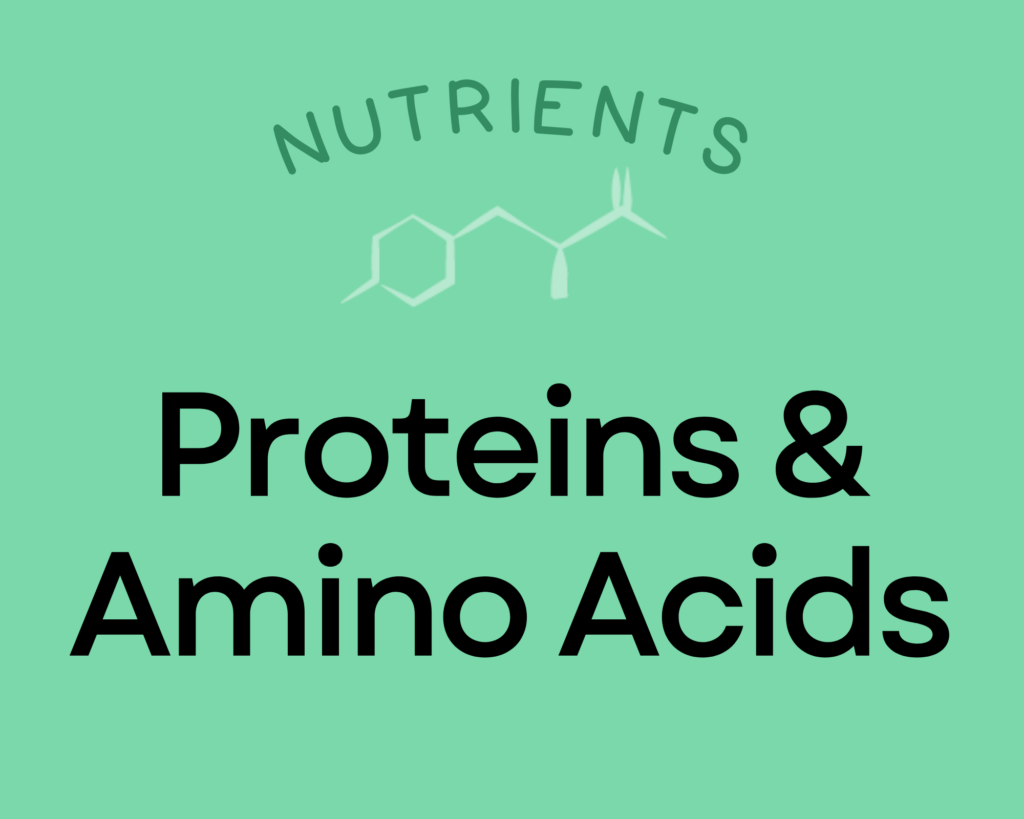
Proteins are the molecules that actually perform most of the various functions of life. In addition to being major structural components of cells and tissues, they have incredibly diverse roles from driving chemical reactions (e.g., enzymes) to signaling (e.g., some types of hormones) to transporting and storing nutrients. Dietary protein is necessary to supply the amino acid building blocks for all of the proteins in our bodies. The recommended daily allowance of protein is 0.36 grams per pound body weight (0.8 grams per kilogram of body weight). That amounts to 56 grams for a 150-pound person. However, it’s important to emphasize that this number is considered a minimum daily allotment, and there is no established upper limit. In fact, many studies have evaluated diets containing three to four times more protein than this minimum and proven benefits to weight management, body composition, hormone regulation, and cardiovascular health. These studies suggest that an optimal protein intake for most people is probably in the range of 1.2 to 1.8 grams per kilogram bodyweight (82 to 122 grams for that same 150-pound person), and that people who are very active may see the best results at even higher intake. Learn more about protein and amino acids here.
Atlantic Mackerel Provides 31% DV MUFA
This fish is also an excellent source of monounsaturated fatty acids (MUFA), providing 31% of the daily value per 4-ounce serving!
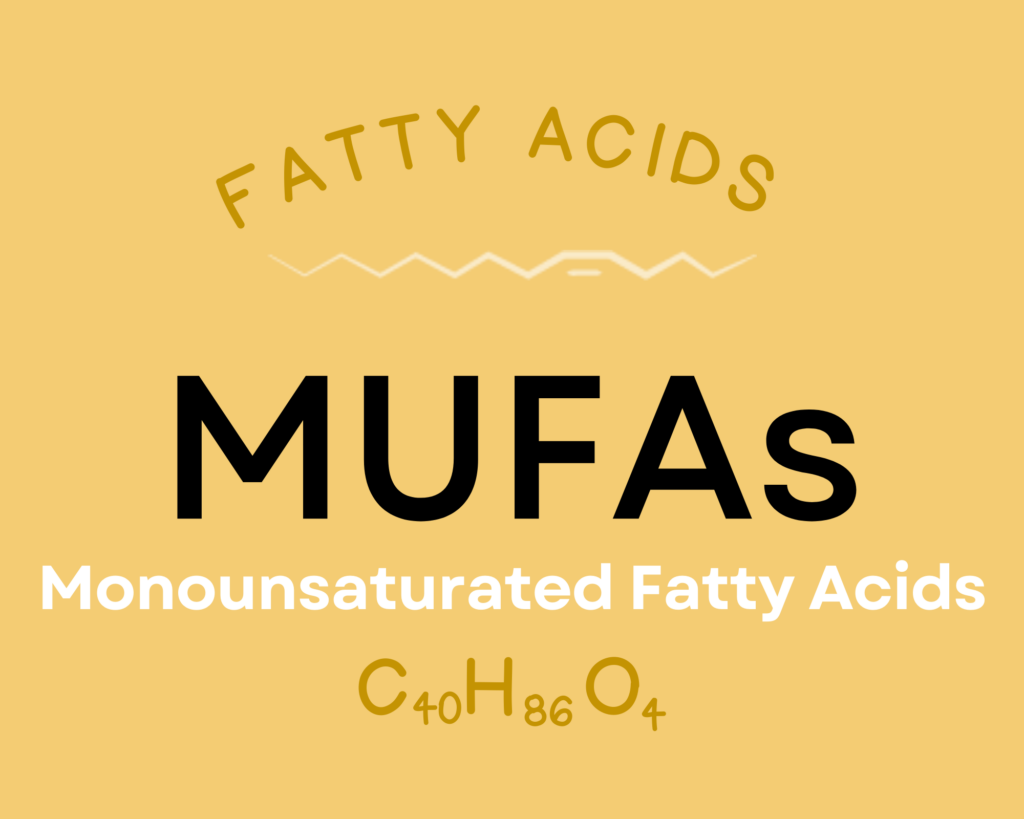
Monounsaturated fatty acids (MUFA), the most abundant of which is oleic acid, play an important role in cellular function due to its presence in phospholipids in cell membranes. Oleic acid is beneficial for cardiovascular health—both in reducing risk factors like high blood pressure, cholesterol, triglycerides, inflammation, and oxidative stress, and in reducing actual cardiovascular disease incidence and events. Oleic acid has even demonstrated anti-cancer activity, with an ability to inhibit the progression, proliferation, and metastasis of several types of cancer cells. Research shows this fat could benefit body weight regulation and obesity through its effects on energy metabolism and lipogenesis. In fact, human trials show that enriching diets with oleic acid leads to decreases in central obesity, abdominal fat, body weight, and food intake, while also possibly increasing energy expenditure! Oleic acid also possesses some benefits for diabetics—influencing genes and pathways involved in insulin signaling and glucose metabolism, as well as helping protect against some complications of diabetes, like diabetic retinopathy and atherosclerosis. Learn more about oleic acid here.
Atlantic Mackerel Provides 28% DV Vitamin B2 (Riboflavin)
Atlantic mackerel is high in vitamin B2 (riboflavin), providing 28% of the daily value per 4-ounce serving!
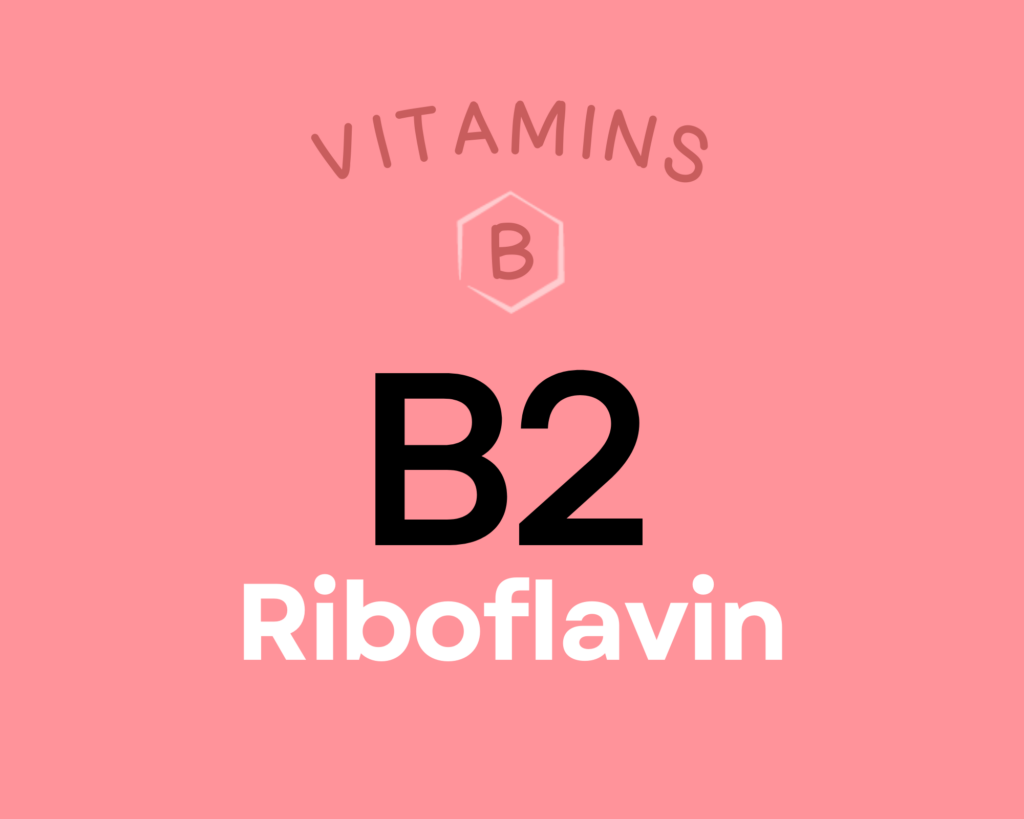
Riboflavin (or vitamin B2) is a vitamin that helps form two important coenzymes involved in oxidation-reduction reactions: flavin mononucleotide (FMN), and flavin adenine dinucleotide (FAD). Collectively, these coenzymes are involved in antibody production, energy production, growth and development, skin and hair health, and the metabolism of several other nutrients (vitamin B6, niacin, folate, and iron). Research suggests a role for riboflavin in preventing or treating migraine headaches, cardiovascular disease, cataracts, and preeclampsia during pregnancy. It also possesses some anti-cancer properties due to its involvement in folate metabolism and MTHFR activity. Learn more about vitamin B2 here.
Atlantic Mackerel Provides 27% DV Vitamin B6 (Pyridoxine)
In addition, Atlantic mackerel contains a significant amount of vitamin B6 (pyridoxine), providing 27% of the daily value per 4-ounce serving!
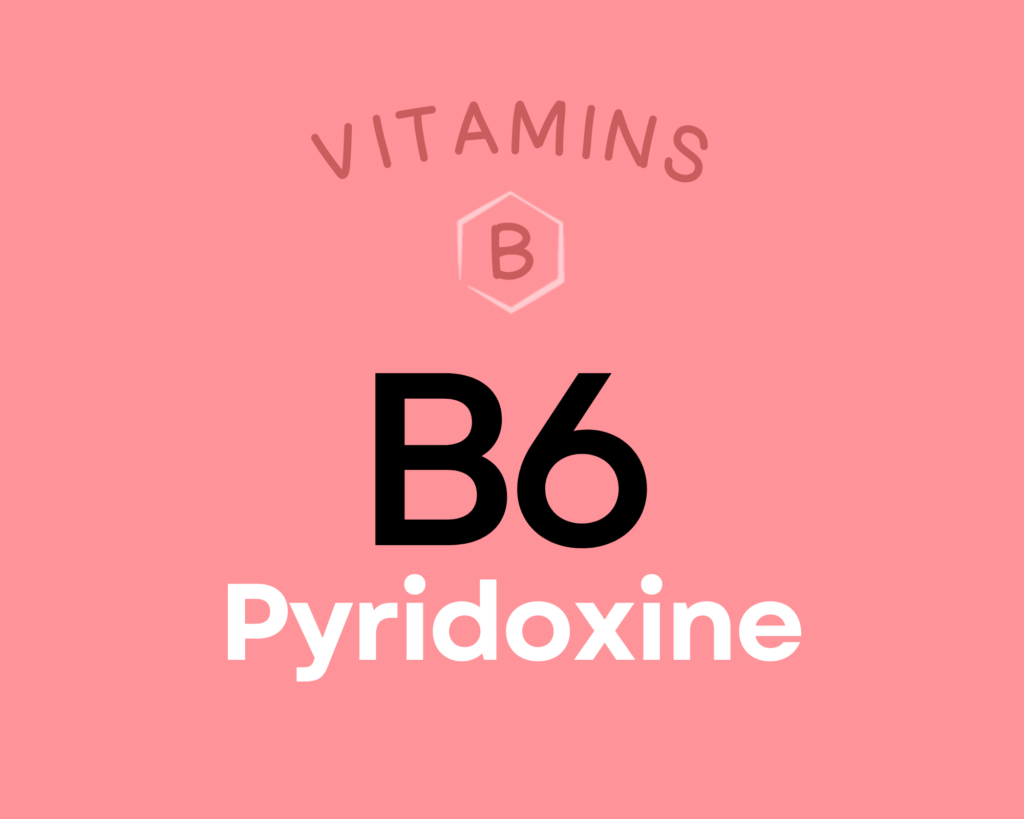
Vitamin B6 (pyridoxine) is a group of six water-soluble compounds with a similar chemical structure, all of which can be converted into their active form of pyridoxal 5’-phospate (PLP). Over 100 different enzymes require vitamin B6 in order to carry out their various functions in protein metabolism, fatty acid metabolism, neurotransmitter production, gluconeogenesis, hemoglobin synthesis, the release of glucose from glycogen, and energy metabolism (particularly the production of ATP in the Krebs cycle). Research suggests vitamin B6 may help protect against cardiovascular disease and certain cancers, could reduce the risk of depression among the elderly, and even reduce symptoms of morning sickness and PMS. Learn more about vitamin B6 here.
Atlantic Mackerel Provides 27% DV Vitamin B7 (Biotin)
This fish is also an excellent source of vitamin B7 (biotin), providing 27% of the daily value per 4-ounce serving!
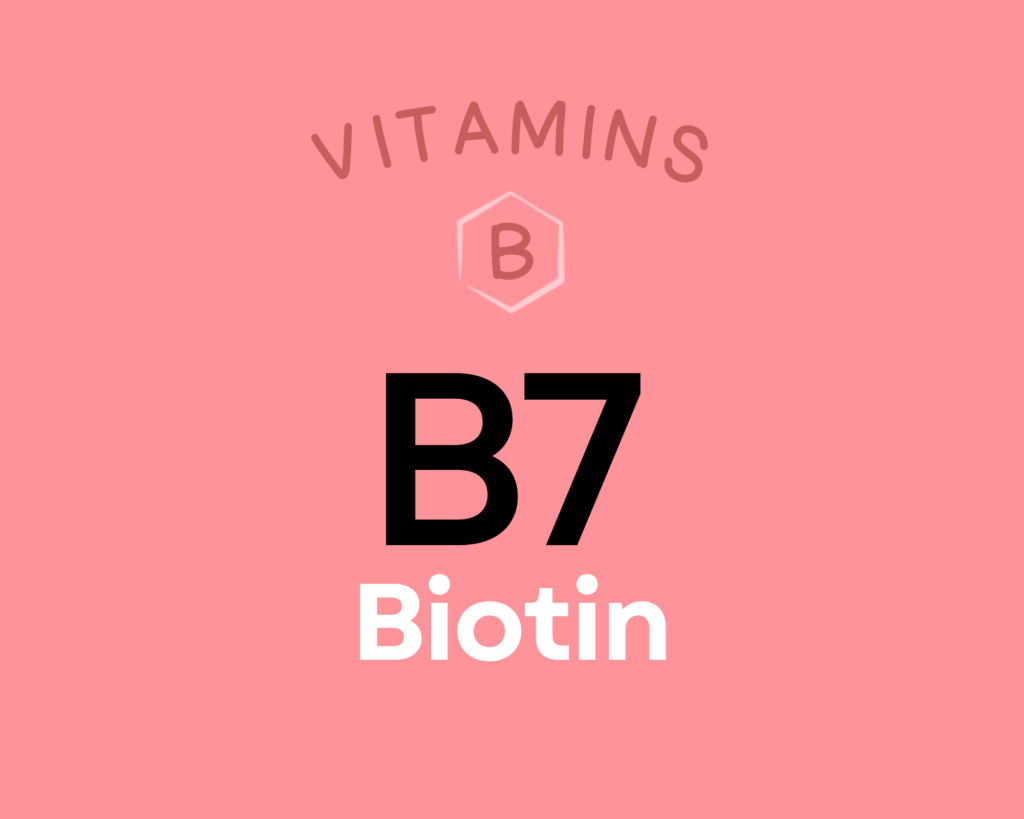
Biotin is a water-soluble B vitamin, also known as vitamin B7. Like other B vitamins, it plays an important role in energy metabolism (serving as a coenzyme for five carboxylase enzymes), neurotransmitter production, cellular function, and the function of various organs. Getting enough biotin can help support healthy nail and hair growth. It’s also particularly important during pregnancy, with low intakes increasing the risk of premature delivery and birth defects. There’s even some evidence biotin can benefit diabetics and reduce functional disabilities in people with multiple sclerosis. Learn more about biotin here.
Atlantic Mackerel Provides 26% DV Iodine
Atlantic mackerel is a great source of iodine, providing 26% of the daily value per 4-ounce serving!
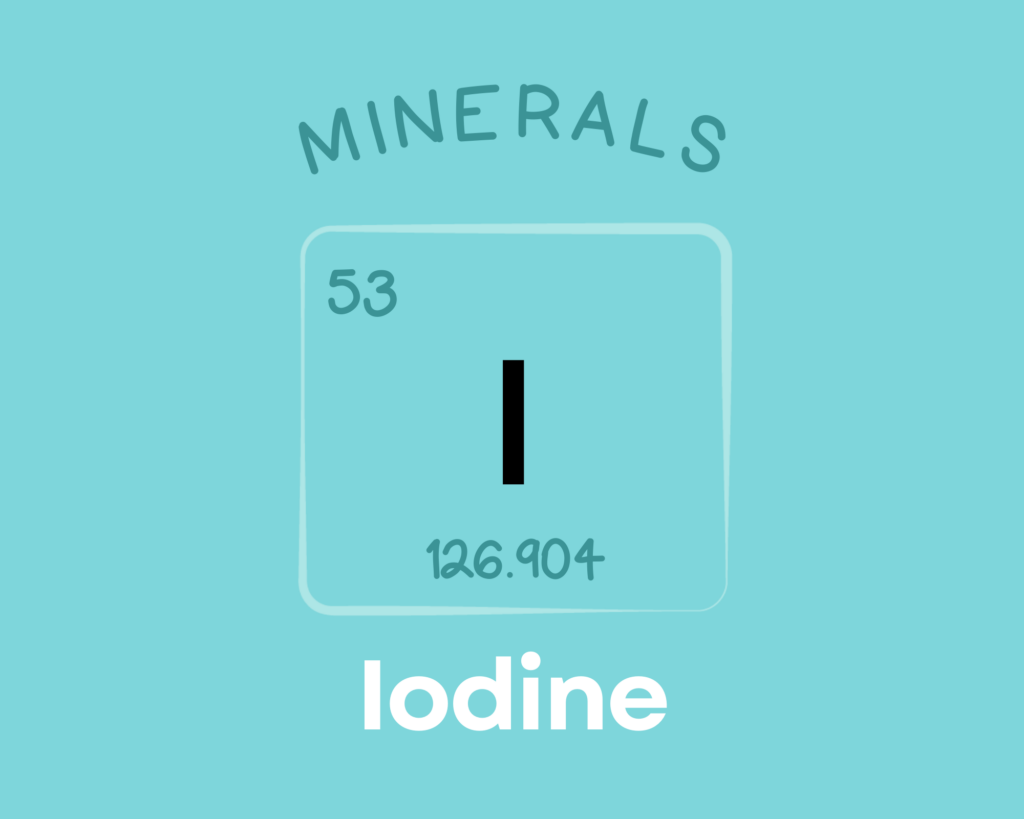
Iodine is a trace mineral that serves as a structural component of thyroid hormones, giving it a major role in thyroid health and function. As a result, it’s involved in regulating metabolism, reproductive function, fatty acid release, carbohydrate absorption, growth, and development. Consuming adequate amounts is particularly important during pregnancy (for preventing complications like preeclampsia, preterm delivery, miscarriage, and stillbirth) and during childhood (where it supports central nervous system development). Untreated iodine deficiency can lead to goiter and hypothyroidism. Learn more about iodine here.
Atlantic Mackerel Provides 89.7 mg of Taurine
Atlantic mackerel is also a substantial source of taurine, containing 89.7 mg of taurine per 4-ounce serving!
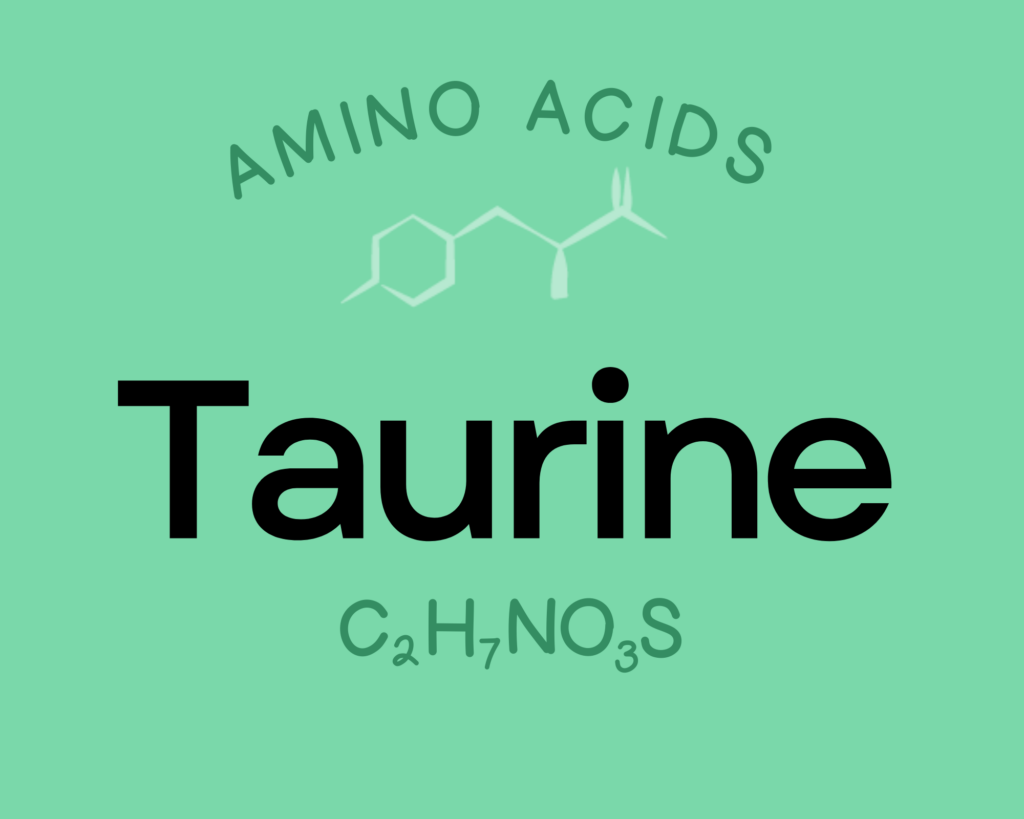
Taurine is a non-proteinogenic amino sulfonic acid that supports neurological development, serves as a major component of bile (which helps to digest fats), and plays a role in water and mineral regulation within the blood (including through membrane stabilization and calcium signaling). Taurine also regulates the immune system and serves as an important antioxidant, and it plays a role in cardiovascular function and the development of skeletal muscle.
Atlantic Mackerel Provides 21% DV Magnesium
In addition, this fish is an excellent source of magnesium, providing 21% of the daily value per 4-ounce serving!
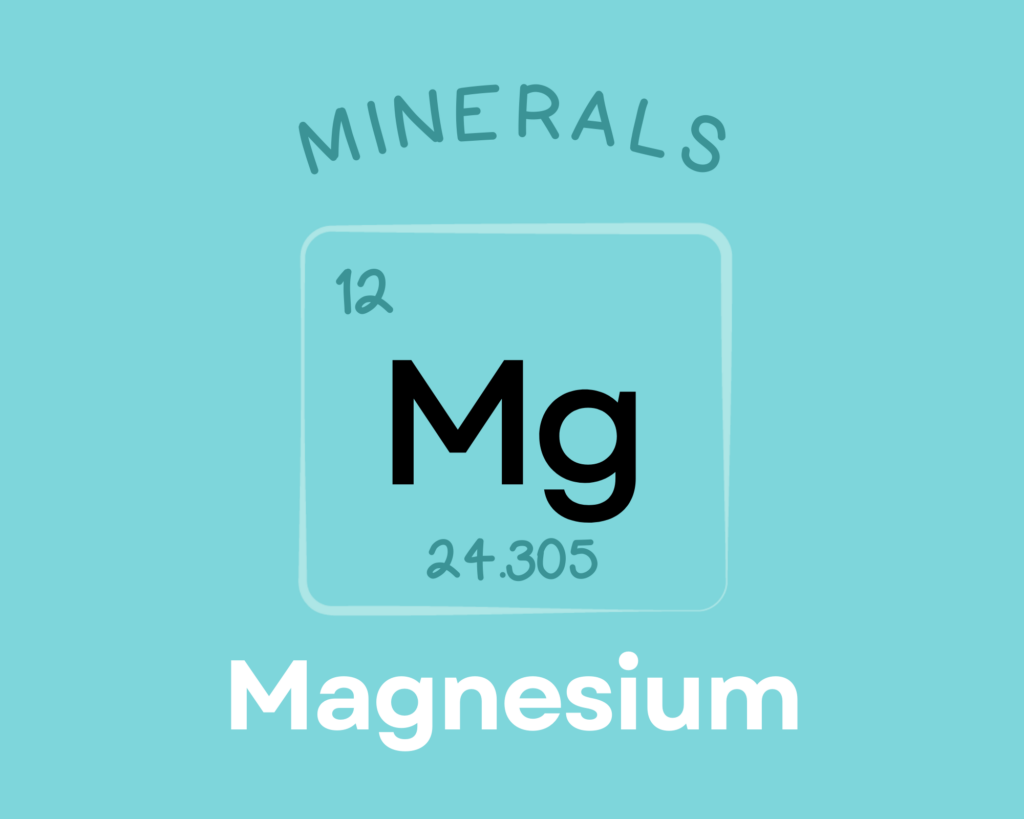
Magnesium is an essential mineral needed by every cell in the body. As an electrolyte, it’s important for regulating fluid balance, nerve and muscle function, blood pH, and neurotransmission. It also serves as a cofactor for hundreds of different enzymes, giving it a role over 300 metabolic reactions—including pathways for cell signaling, energy production, protein synthesis, nucleic acid synthesis, and ion transport. Magnesium also has important structural functions in cells and bone tissue. Consuming enough magnesium may help protect against a variety of chronic diseases, including cardiovascular disease, type 2 diabetes, and osteoporosis. Learn more about magnesium here.
Atlantic Mackerel Provides 20% DV Phosphorus
Atlantic mackerel is a wonderful source of phosphorus, providing 20% of the daily value per 4-ounce serving!
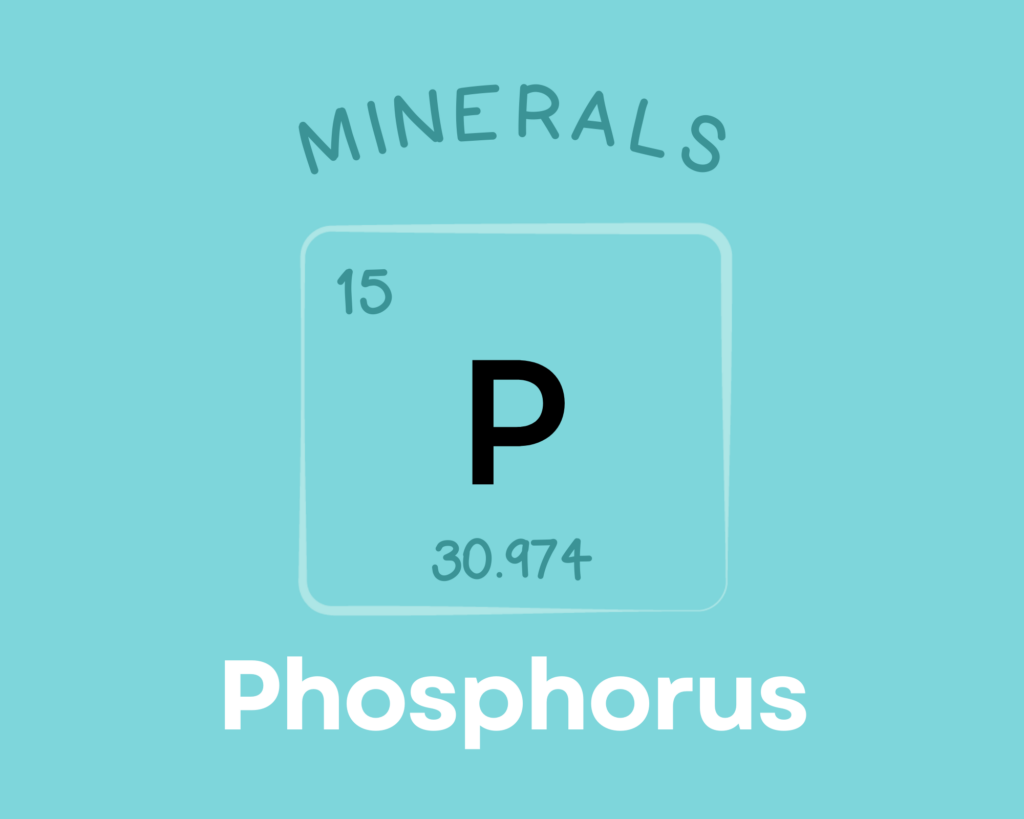
Phosphorus is an essential mineral that makes up about 1% of the total weight of the human body. Along with serving an important structural role for building nucleic acids and cell membranes, phosphorus is involved in numerous biological processes—including acid-base regulation, energy production, cell signaling, and bone mineralization. Excess phosphorus has been linked to a higher risk of cardiovascular disease, fractures, and osteoporosis, especially in the context of a low-calcium diet. Learn more about phosphorus here.
Atlantic Mackerel Provides 20% DV Vitamin B5 (Pantothenic Acid)
Additionally, Atlantic mackerel is an excellent source of vitamin B5 (pantothenic acid), providing 20% of the daily value per 4-ounce serving!
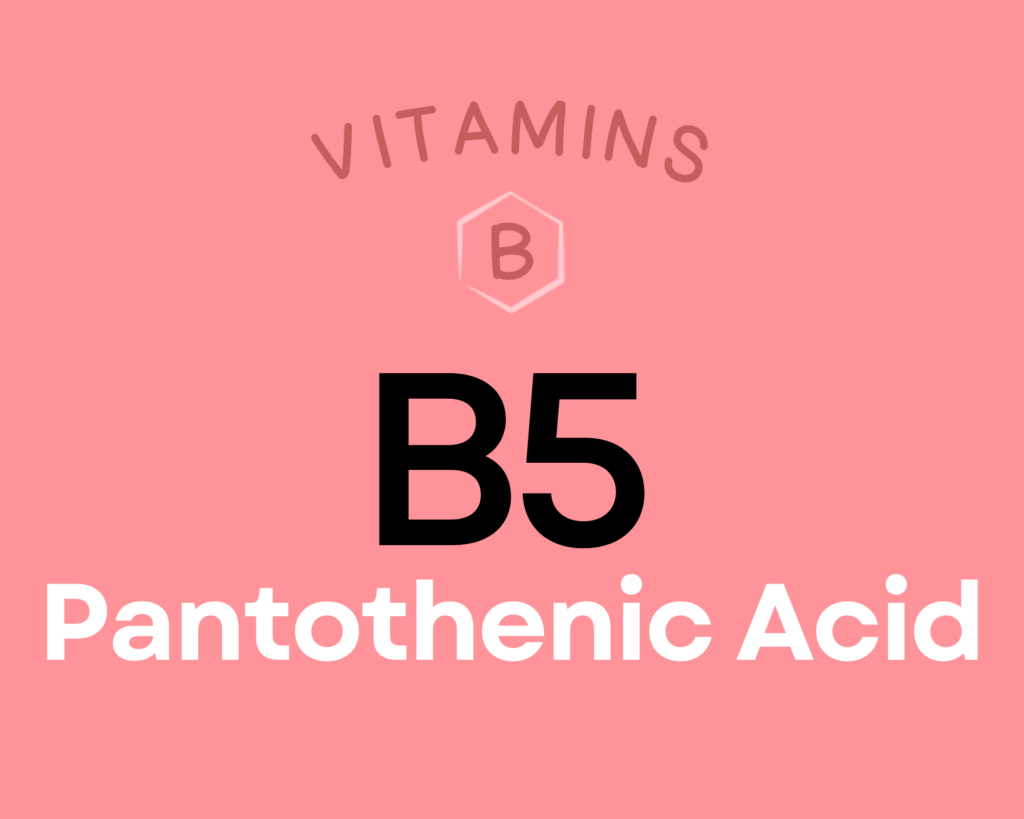
Pantothenic acid (or vitamin B5) is a water-soluble vitamin that serves as a cofactor for coenzyme A—which itself is critical for metabolizing many drugs and toxins, as well as forming derivatives (acetyl-CoA and succinyl-CoA) that participate in the synthesis of cholesterol, fatty acids, melatonin, the neurotransmitter acetylcholine, steroid hormones, heme, and vitamins A and D. Coenzyme A is also needed in the Krebs cycle, giving pantothenic acid a role in energy metabolism. Research suggests that a pantothenic acid derivative (pantethine) can help improve blood lipid profiles and reduce fatty streak formation and lipid deposition in the arteries, giving it a cardio-protective role. Additional research shows that panthothenic acid can accelerate wound healing, boost cellular production of the important antioxidant glutathione, and possibly help improve symptoms of rheumatoid arthritis. Learn more about vitamin B5 here.
Learn What Foods Are the Best Sources of Every Nutrient

The Top 25 Foods for Every Nutrient
The Top 25 Foods for Every Nutrient e-book is a well-organized, easy-to-use, grocery store-friendly guide to help you choose foods that fit your needs of 43 important nutrients while creating a balanced nutrient-dense diet.
Get two “Top 25” food lists for each nutrient, plus you’ll find RDA charts for everyone, informative visuals, fun facts, serving sizes and the 58 foods that are Nutrient Super Stars!
Buy now for instant digital access.
How Much Atlantic Mackerel Should We Eat Per Day?
Fish are nutrient-dense sources of highly-digestible complete protein and outstanding sources of important nutrients in which we are commonly deficient. Let’s just say this seafood is “off the hook!” (Pun intended.)
Fish and shellfish are not only nutrient-dense sources of highly-digestible gut-friendly complete protein and the best food sources of the very important long-chain omega-3 fatty acids, DHA and EPA, but they’re outstanding sources of important nutrients in which we are commonly deficient. Eating seafood reduces risk of cardiovascular disease, type 2 diabetes, obesity and some forms of cancer.
Fish is a great source of vitamins B1, B2, B3, B6, B9, B12 and E, zinc, phosphorus, magnesium, iron, copper, potassium and selenium, with oily cold-water fish also providing substantial amounts of vitamin A and vitamin D. Fish with bones remaining, such as canned salmon and sardines, are the best dietary sources of calcium in the food supply. And marine fish are an excellent dietary source of iodine.
In fact, every 100 grams per day of seafood decreases all-cause mortality by 7%. And, every 20 grams per day of fish decreases cardiovascular disease mortality by 4%. Aim to eat three or more servings of seafood weekly (and up to every meal!). Learn more about seafood here.
It’s always best to mix up the foods you eat day to day (aiming for a wide variety of different fish and shellfish throughout the week), and mackerel definitely has a place at the table.
Easily track your servings of Nutrivore Foundational Foods!
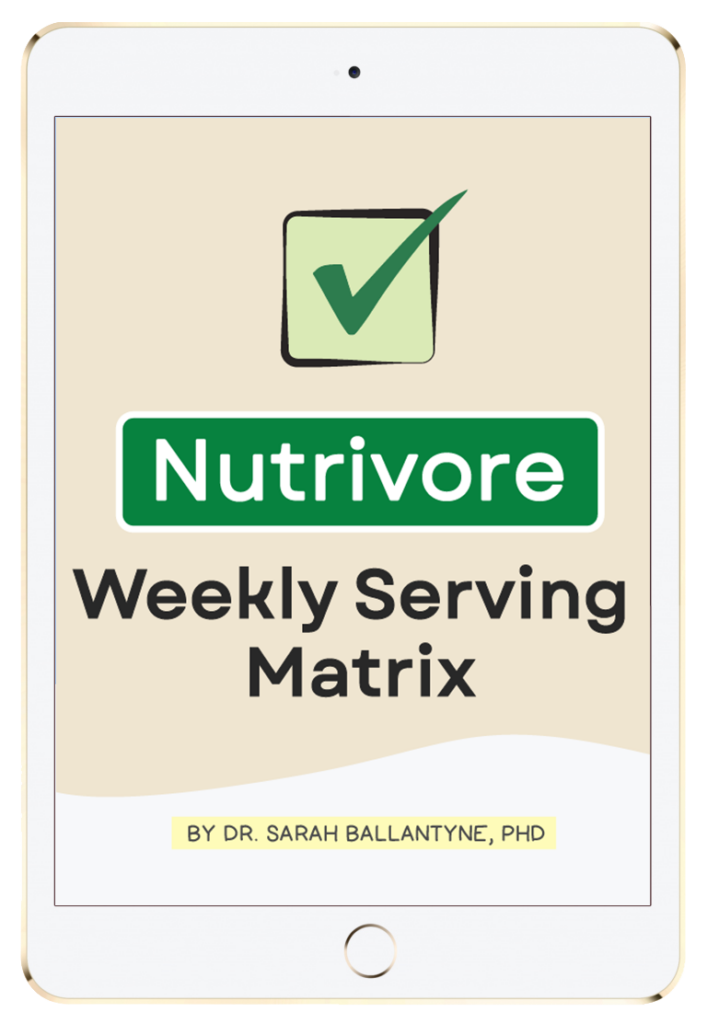
The Nutrivore Weekly Serving Matrix
The Nutrivore Weekly Serving Matrix digital resource is an easy-to-use and flexible weekly checklist designed to help you maximize nutrient-density and meet serving suggestions of Nutrivore foundational foods, all without having to weigh or measure your foods!
Includes a 22-page instructional guide and downloadable interactive guides.
Buy now for instant digital access.
Citations
Expand to see all scientific references for this article.
Chin SF, Liu W, Storkson J, Ha Y, Pariza M. Dietary sources of conjugated dienoic isomers of linoleic acid, a newly recognized class of anticarcinogens. Journal of Food Composition and Analysis. 1992 Sept(5):185-197. DOI:10.1016/0889-1575(92)90037-K
Gormley TR, Neumann T, Fagan JD, Brunton NP. Taurine content of raw and processed fish fillets/portions. European Food Research and Technology. 2007. 225(5):837-842. doi: 10.1007/s00217-006-0489-4
Pravst I, Zmitek K, Zmitek J. Coenzyme Q10 contents in foods and fortification strategies. Crit Rev Food Sci Nutr. 2010 Apr;50(4):269-80. doi: 10.1080/10408390902773037. PMID: 20301015.
Sprague M, Chau TC, Givens DI. Iodine Content of Wild and Farmed Seafood and Its Estimated Contribution to UK Dietary Iodine Intake. Nutrients. 2021 Dec 31;14(1):195. doi: 10.3390/nu14010195. PMID: 35011067; PMCID: PMC8747335.
USDA Food Central Database: Fish, mackerel, Atlantic, raw
Watanabe T, Kioka M, Fukushima A, Morimoto M, Sawamura H. Biotin content table of select foods and biotin intake in Japanese. Int J Anal Bio-Sci. 2014. Vol 2(4):109-125.


